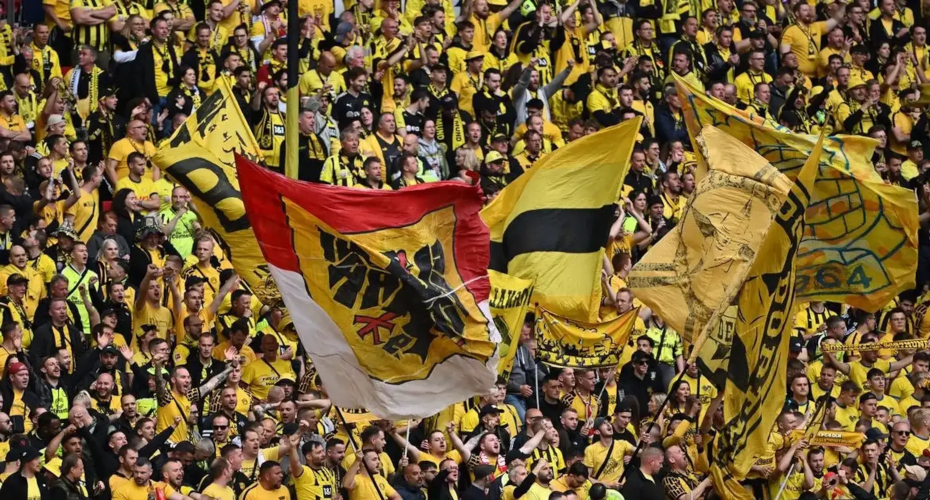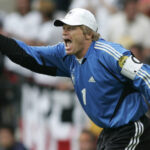On the Wednesday before their Champions League final against Real Madrid in June, Borussia Dortmund finalised what could be considered the most contentious sponsorship agreement in German football history.
They inked a deal valued at over €20 million (£17 million; $21 million) for the next three years with Rheinmetall, a Düsseldorf-based arms manufacturer. Starting next season, Rheinmetall’s logos will be displayed on in-stadium advertising boards.
Rheinmetall, known for producing tanks, weapons, and ammunition, has become one of Dortmund’s highest-tier commercial partners. This marks the first time a Bundesliga club has partnered with a sponsor from the defence sector, sparking a wave of protests from fans, media, and politicians at various levels. However, the deal has also found support. A poll conducted by Ruhr Nachrichten, a major local newspaper in Dortmund, revealed that 55 percent of 10,000 respondents approved of the deal.
Announcing the sponsorship just before the Champions League final, BVB CEO Hans-Joachim Watzke expressed anticipation for the partnership with Rheinmetall, emphasising that Borussia Dortmund was deliberately opening itself up to discussion.
This discussion has indeed begun, with protests being the most visible reaction.
In Dortmund, demonstrations occurred in front of the club’s offices following the announcement. On 1 June, the day of the Champions League final, the political party The Left inflated a massive red tank in Dortmund city centre, demanding the deal’s termination. At Wembley, supporters displayed a banner accusing the club of sportswashing: “Rheinmetall: using football to clean your image.”
The criticism has been intense. Online, rival supporters have created images of tanks, assault vehicles, and missiles in Dortmund’s yellow and black colours, mocking the club’s commercial image.
Michael Schulze von Glasser, political manager of the German Peace Society and a Borussia Dortmund fan, has been outspoken in his opposition, immediately calling for the deal to be annulled.
“It felt like my love was cheating,” Von Glasser says. “After the advertising deal was announced at the end of May, I hardly had any passion left to cheer on the team in the Champions League final. BVB advertises with the slogan ‘Real Love’ (Echte Liebe), but it’s growing cold. Football has never been apolitical for me, but it has always balanced my political work. Now the BVB executive board is letting the military move in to take that space away.”
Von Glasser organised protests in the weeks following and encountered significant opposition. “About three-quarters of the fans don’t like the advertising deal,” he says. “It shakes the club’s core values.”
“In 2022, BVB spoke out against violence in a code of basic values, but weapons are there to be used for violence. Furthermore, Rheinmetall is simply a company that profits from war and armament, which is morally questionable, to say the least. That’s why many fans are disappointed and angry about the advertising deal: some have told me they will no longer renew their season tickets. Others have even disposed of all their BVB merchandise. It’s all very sad.”
However, defence of the agreement is also prominent, reflecting significant changes in German attitudes towards rearmament and military spending. One argument is that Rheinmetall is necessary in the modern world, especially in an unstable Europe. Germany’s vice-chancellor, Robert Habeck, said that while “unusual,” the deal “reflected the reality of the changing times.”
Watzke, the club’s CEO, echoed this sentiment. “We have war in Europe for the first time in many decades. The majority of Germans welcome the fact that the Bundeswehr (the German armed forces) is being modernised to safeguard freedom and democracy. Likewise, there is a clear majority of people who want us to support Ukraine, which is suffering from Russia’s war of aggression. But both of these things only work with modern defence technology. Where would Ukraine be today without weapons from the United States and Europe? Security and defence are cornerstones of our democracy. This is why we believe it is appropriate to focus on protecting these cornerstones. Particularly now, when we are experiencing each day how freedom in Europe has to be defended. We should deal with this new normal.”
German Chancellor Olaf Scholz told broadcaster ARD in late June that “if we want to have a strong Bundeswehr and if we want to defend ourselves against others and prevent war from breaking out, we need companies that produce armaments, and Rheinmetall is one of those.”
According to information published by the German Federal Government, the country spent €6.6 billion on military assistance to Ukraine in 2022 and 2023. A significant amount was invested in weapons and ammunition manufactured by Rheinmetall. However, Rheinmetall products are not sold exclusively to Ukraine.
“Even if you argue like Watzke,” says Von Glasser, “weapons are still used to exercise violence, which is not compatible with BVB’s core values. The supporters of the advertising deal are also deliberately ignoring Rheinmetall’s other business: the Düsseldorf-based company has long been arming Russia under Vladimir Putin — the Russian soldiers in Ukraine were trained in Rheinmetall’s modern combat training centre, among other places.”
That agreement with Russia was signed in 2011. Following Putin’s annexation of Crimea in February and March of 2014, Rheinmetall did not end the contract. It was only halted in August 2014 when it was cancelled by the German government.
“Qatar is also supplied by Rheinmetall,” says Von Glasser. “A country where homosexuality is a punishable offence and which is known for numerous human rights violations has been equipped with Leopard 2 tanks and Panzerhaubitze 2000 howitzers.”
He concluded: “Rheinmetall’s values are incompatible with those of BVB.”
In January 2024, Der Spiegel reported that an agreement between Germany and Israel to supply 10,000 rounds of precision tank shells had been reached and that Rheinmetall would be the supplier.
Rheinmetall does not agree that its values are incompatible with Borussia Dortmund. “BVB and Rheinmetall are two partners whose ambitions, attitude, and origins are a good match,” a company spokesman said. “BVB comes from the heart of North Rhine-Westphalia and stands for the pursuit of top performance and international success like hardly any other German club. Rheinmetall is deeply rooted in the Rhine-Ruhr metropolitan region and wants to raise the international profile of its brand as a defence and technology group. With BVB, Rheinmetall promotes top performance made in North-Rhine Westphalia and is given a platform to raise its international profile as a technology group and attractive employer.”
German football is highly resistant to commercialism. Its 50+1 rule, which keeps majority control of clubs in the hands of members, has protected the Bundesliga from state ownership and billionaire investment — but controversial sponsorship is not new.
In 2022, Schalke cancelled their partnership with state-supported energy company Gazprom after Russia invaded Ukraine. That deal was viewed as a soft-power exercise when it was signed in 2007 and had been a long-standing source of friction.
More recently, Bayern Munich’s relationship with Qatar Airways, who were the club’s sleeve sponsor between 2018 and 2023, attracted venomous opposition, causing Bayern’s 2021 AGM to descend into chaos amid protests from supporters.
An arms manufacturer is fresh territory, though, and this deal occurs during a new period in German history when attitudes towards national security and defence spending are changing.
From the end of the Second World War until 2022, the country exercised caution around military rearmament. But days after Putin’s invasion of Ukraine, under international pressure and having provoked scorn for sending 5,000 military helmets in solidarity, Chancellor Scholz gave a stirring speech in the Bundestag. Putin, he said, “had created a new reality” and “this reality demands a clear answer.” Scholz is not an orator, nor a charismatic politician, and yet his speech was greeted by strong applause. When a €100 billion military procurement fund was announced in June 2023, that too was supported.
Today, this is known as Germany’s Zeitenwende — its “turning point.” The spending it was committing to was a dramatic departure from previous foreign policy. Announcing new measures in November 2023, defence minister Boris Pistorius said that “as the most populous and an economically strong country at the heart of Europe, Germany must be the backbone of deterrence and collective defence in Europe.”
According to Rheinmetall, this is why the time is right for this sponsorship. “The Zeitenwende has anchored the importance of security and defence more deeply in society,” their spokesman told The Athletic. “The topic of defence capability is meeting with broader acceptance, but still deserves greater attention.”
According to a poll conducted by PricewaterhouseCoopers in February 2024, many Germans agree. Sixty-eight percent were in favour of “expanding the country’s defence capabilities.” More than two-thirds of those polled believed that progress following the Zeitenwende — which included the provision of more money and better equipment for the Bundeswehr — had not been quick enough.
That remains the case. Scholz is also criticised by those uneasy with rearmament. In July, it was announced that U.S. long-range missiles would be deployed in Germany by 2026, for the first time since the Cold War ended. The Greens, who are part of the ruling coalition with Scholz’s Social Democratic Party (SPD), were critical of the decision to allow it. He also faced opposition from within his own party.
“This will not make the world safer,” said the SPD’s Ralf Stegner. “On the contrary, we are entering a spiral in which the world is becoming increasingly dangerous.”
As if to describe the divisiveness of the issue, the embattled Scholz, whose approval ratings are dwindling, received support from the Christian Democratic Union (CDU), the coalition’s conservative opposition.
“This is good news, which shows that the United States is standing by its security guarantees,” said a party spokesman, responding to the missile announcement. “We need an adequate deterrent against Russia.”
That is the external context. For Borussia Dortmund, there remain jarring aspects beyond the argument. With their loud stadium, cheap tickets, and astute marketing, Dortmund is seen as a footballing force for good. Internally, fan campaigns have led admirable fights against racism, antisemitism, and homophobia, helping to rid the terraces of the sort of chanting found in parts of Germany where there is still a far-right presence. To a lot of supporters, especially those disenfranchised by Premier League teams, these attributes combined give Dortmund an aspirational quality that will have made the Rheinmetall association more shocking.
One of the local areas in which fans gather in their thousands to watch big Dortmund games in public is Friedensplatz, Peace Square, where there is a monument commemorating the victims of the Hiroshima bombing. The sculpture is decorated by messages promoting global peace, in all sorts of different languages. Friedensplatz is associated with Borussia Dortmund — who are now sponsored by Germany’s largest weapons manufacturer.
The tension is clear.
By entering into this partnership, Dortmund has also been accused of benefiting financially from a company that profits from war. Since February 2022, the Rheinmetall share price has risen by over 430 percent. Demand for their products has never been higher. Most recently, on June 20, the company signed a framework contract worth up to €8.5 billion with the Bundeswehr for the delivery of 150mm artillery ammunition to Germany and some of its allies. It is the largest deal in Rheinmetall’s history.
This is not the company’s first move into sport. Rheinmetall is a sponsor of Bergischer HC, who compete in handball’s Bundesliga. Since 2022, it has been a sponsor of two basketball clubs — men’s team LFDY Düsseldorf and women’s side Düsseldorf ZOOS. On June 4, a week after news of the agreement with Dortmund became public, it was announced that a sponsorship deal worth “six figures” had been agreed with Düsseldorfer EG, who compete in the German Ice Hockey League.
Rheinmetall’s sporting portfolio is growing significantly, but why, given that its industry has support at the highest levels of government and appears to be benefiting from changes to the national mood?
Rheinmetall says it “wants to raise the international profile of its brand as a leading international systems provider for security technology and as a driver of industrial innovation in civilian markets.”
The statement continues: “Our aim with this partnership is to be recognised even more strongly as an attractive employer both nationally and internationally in the competition for highly qualified specialists.”
Supporters of the deal also argue this to be an abstract form of solidarity. On May 30, the Ruhr-based journalist Ulrich Breulmann wrote: “The club is not glorifying hand grenades or guns, and certainly not killing. But the club is saying: we respect what you do for our country and other free countries in the world. We know that people neither love nor celebrate you for what you do. But we express solidarity: you are doing something that has to be done if we want to continue living our lives this way and not the way a dictator forces us to.”
Von Glasser disagrees. “It’s interesting that a company is advertising here whose products ordinary people can’t buy. So, it’s about something else: Rheinmetall wants to convince BVB fans that the current armament is a good thing and that more taxpayers’ money should be spent on the company’s weapons.
“Fortunately, many BVB fans have not forgotten that armament and war are fundamentally bad things. And a look around the city will remind them of this every time: 66 percent of the city was destroyed in the Second World War and the reconstruction was very ‘functional’.”
The European Championship removed this topic from the back pages. In Dortmund, pre-season and excitement over new transfer signings have combined to keep the Rheinmetall story beneath the fold. But only for now. The discourse that Hans-Joachim Watzke admitted that his club was opening itself up to has begun and is nowhere near an end.
It’s interesting that a company is advertising here whose products ordinary people can’t buy. So, it’s about something else.
— Michael Schulze von Glasser, political manager of the German Peace Society









